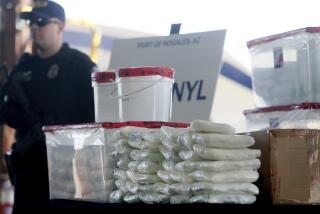Drug Conference Calls for Global Effort Against Traffickers : War on narcotics: Consuming and producing countries are urged to cooperate. Legalization is rejected as a tactic.
- Share via
LONDON — Representatives of 112 countries on Wednesday bridged the North-South divide between producers and consumers of illegal drugs, saying that expanding use has blurred the difference and that international action is needed.
The delegates to the first World Ministerial Summit to Reduce Demand for Drugs and to Combat the Cocaine Threat also rejected legalization as a means of combatting drug-related crime.
“We in Britain see no place whatsoever for legalization, and that view was shared by everybody else,” British Home Secretary David Waddington told a press conference after the close of the three-day meeting, co-sponsored by Britain and the United Nations.
“We’ve got what we wanted,” Margaret Anstee, director of the U.N. office in Vienna and coordinator of U.N. drug control programs, said in a post-conference interview. “We wanted a political demonstration by a so-called consumer country, supported by others, that they really do recognize this as a major problem and are determined to do something about it.”
Anstee said it would have been “fantastic” if the United States, as probably the world’s largest consumer of illicit drugs, had stepped forward. But it was Britain’s Prime Minister Margaret Thatcher who took up the cause.
“You know how she seizes on issues,” Anstee commented.
Nonetheless, Anstee said she was “very impressed” with U.S. participation in the conference. The U.S. delegation was led by Secretary of Health and Human Services Louis W. Sullivan, who stayed for all three days and took an active part in committee meetings.
Washington has been criticized in Europe and elsewhere for concentrating on the problem of illicit drug supplies, allegedly at the expense of tackling the tougher challenge of reducing demand. But Anstee said she has seen “a definite move in the U.S. position,” with “more emphasis on demand reduction.”
There were occasional grumbles from developing countries that the industrialized nations are trying to put all the blame for the drug problem on the Third World. But British Home Office Minister David Mellor, a deputy to Waddington, said that trying to divide the world into drug producers and drug consumers is “yesterday’s argument.”
He described drugs as an increasingly international plague, particularly debilitating to young people, that must be tackled on a global scale.
“If it isn’t,” he said, “it’s a hopeless business.”
A 13-page joint declaration described the delegates as “conscious that the problem of illicit demand is not confined to developed, industrialized countries which provide the main economic market for illicitly produced narcotic drugs and psychotropic substances, and that it now increasingly affects developing countries as well.”
There were clear differences of emphasis between a country such as the Netherlands, which takes a more liberal approach to drug users, and the United States.
“Instead of a war on drugs,” a Dutch delegate said, “we prefer to wage a war on underdevelopment, deprivation and lack of socioeconomic status.”
Yet all the delegates opposed legalization, with Britain and the United States taking a particularly tough stand.
Legalization, Thatcher said, “is the way to destroy young lives, ruin families and undermine society itself. Our task is to protect young people, not deliberately expose them to danger.”
She promised that her government “will never legalize illicit drugs, hard or soft.”
Sullivan said two decades of experience in the United States has “demonstrated the price we will pay for appeasement--more drugs, more addiction and more death.” Legalization, he said, “would be a tragic, horrible mistake, and its folly has become so apparent that no one should seriously offer it as an alternative.”
Britain’s Waddington, who had emphasized at Monday’s opening session that the conference must be more than “another talking shop,” noted at the close that “commitments were entered into.”
The joint declaration pledges the governments to a 35-point program of prevention, treatment and rehabilitation.
Third World drug-producing nations failed to win more than a general pledge of help in supporting crop substitution programs. These nations had sought guarantees of sufficiently generous markets for their substitute crops that growers might be lured away from the cultivation of drugs.
More to Read
Sign up for Essential California
The most important California stories and recommendations in your inbox every morning.
You may occasionally receive promotional content from the Los Angeles Times.













